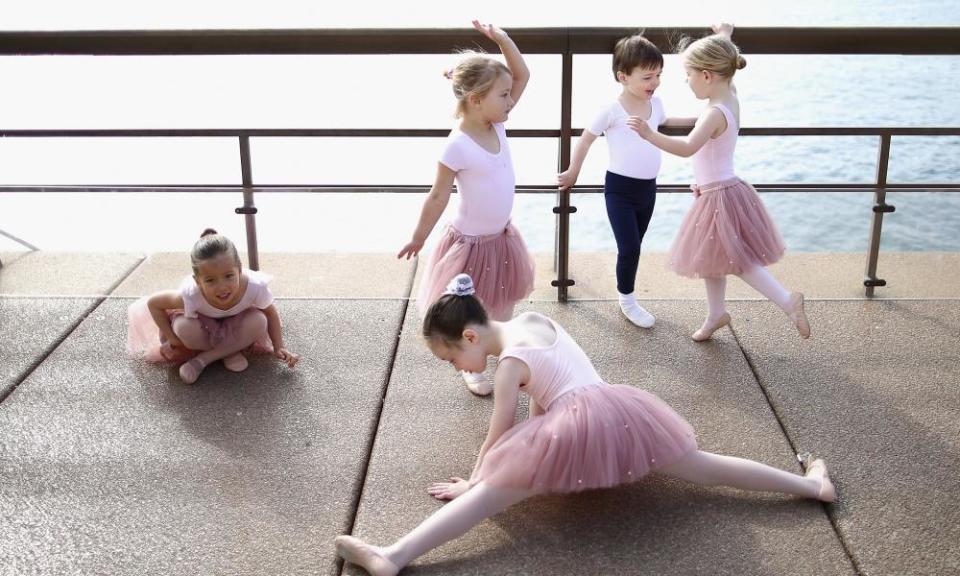Science classes won’t future-proof our children. But dance might | Christina Patterson

Prince George is going to learn ballet. He will wear tights and black shoes, and join girls in pink shoes and tutus, to learn the plié, the relevé and the sauté. He will do this at a private school in Battersea, where he will also be taught kindness, courtesy and humility, and where parents are advised to love their child for “who they are” and not for their ability, for example, to fill a vacant throne.
It makes a change from jousting, hunting, entrail-slicing and the other typical building blocks of life as a male British monarch. “My parents,” said his mother, the Duchess of Cambridge, at a charity event last month, “taught me about the importance of qualities like kindness, respect and honesty.” That, she said, was why she wanted to teach her children the same. These things were, “just as important as excelling at maths or sport”.
In this, she is much like a man I met at a conference last week. His name is Michael Wamaya. He was born in Kibera, one of Kenya’s biggest slums, but was moved by his father to a village when he was 12 because his friends were being killed by the police. When HIV/Aids hit, much of the village was wiped out. At 15, he had to support what was left of his family. He was selling car parts when he saw a poster announcing auditions for a dance school. He went. He passed. He danced in Nairobi. He danced in Bradford. He had offers to dance around the world. He turned them all down, went back to his birthplace and now teaches 150 children ballet every week.
Wamaya was a top 10 finalist for the Global Teacher prize, a $1m award launched by the Varkey Foundation, which aims to recognise and celebrate the best teaching in the world. The prize was won by Maggie MacDonnell, who teaches in an Inuit community in the Canadian Arctic.
“When you do physical theatre,” Wamaya told me, “you learn when to give your weight, and when to let go. These are skills that are fundamental in a human being’s life, but we tend to ignore them.” His pupils, he said, learned how to “reach out” to others. They learned how to communicate. They learned how to listen. They learned how to work as a team. Oh, and their academic performance soared.
Wamaya did not have scientific studies to back up all his assertions. He was telling me what he had seen and learned. But at a session I chaired at the Global Education and Skills Forum in Dubai this month, we heard some of the evidence. A classical music education, said Andreas Schleicher, director for education and skills at the Organisation for Economic Cooperation and Development, has been shown to have an impact on IQ and academic performance. Classroom drama strengthens verbal skills. And dance apparently builds visuo-spatial skills. It literally changes our perception. It teaches us, as Wamaya put it, “what is in front of us and what is behind us”.
Boy, do we need to know “what is in front of us”. The future has never seemed less certain. Since the technological revolution of the past decade – the year of the iPhone, Twitter and the cloud and the year Facebook went global – the world has been changing at a pace never seen before. Last week, PricewaterhouseCoopers predicted that 30% of British jobs would be lost to automation by the 2030s. For the US, the figure is 38%. We will need all the creativity and curiosity and flexibility we can muster. We’ll need all the “innovation” we can get.
We will need all the creativity, curiosity and flexibility we can muster. We will need all the 'innovation' we can get
I actually can’t stand words such as “innovation”. They make me think of “synergies” and management consultants getting rich off other people’s lost jobs. But we will need to be imaginative as we work out how to make the best of the new globalised, high-tech world. And the skills needed for “innovative” jobs, according to the OECD, are those – critical thinking, willingness to question, presenting ideas – you learn from the arts.
There has been a big emphasis in the last few years on the so-called Stem subjects: science, technology, engineering and maths. As education in the UK faces its biggest cuts since the 1990s, that seems set to intensify. These subjects matter. Of course they matter. But if we go all out for Stem and sideline the arts, we’ll produce clones of the robots that will threaten our children’s jobs. Less efficient clones, which will fail.
On that panel in Dubai there was a headteacher from Hong Kong called Ronnie Cheng. He played us a recording of some of his pupils singing a cappella. He played us another one of pupils playing Tchaikovsky. “There’s something,” he said, when he saw the expression on our faces, “that words can’t describe, something deep inside. Once you tap into that thing, it gives life to everything else.”
Cheng is right. Wamaya is right. So, in fact, is the OECD. We need the arts more than ever. Sure, we need the skills they teach us at a time of great challenge, but we need the arts because they light up our lives. We need them because a human heart is a human heart whether in a Kenyan slum or a gilded cage.

 Yahoo News
Yahoo News 